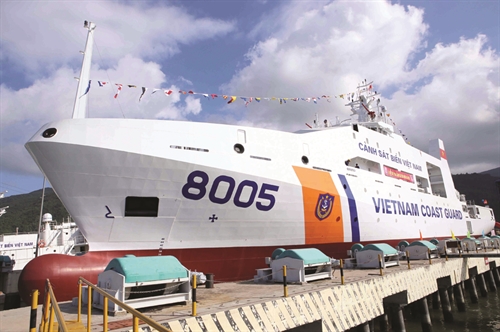Lawyer Hoang Thi Hong Hanh[1], LLM.
Introduction
Vietnam is keen on developing its maritime economy. With the accession to the Trans-Pacific Partnership Agreement (TPP), Vietnam will be an international trading and transshipment hub in the Asia-Pacific region. As a result, shipping and maritime activities in Vietnam, such as shipbuilding, ship agency, maritime transportation, port operation, logistic services, will vigorously develop.
In their business, ship owners have two ways to expand their fleet: purchasing existing ships or building new ships. Countries with a low-developing shipbuilding industry often buy ships from developed nations with a long shipbuilding history like the Netherlands, Norway, Japan, China, etc., specially in buying huge-tonnage and modern ships.
An international sale and purchase of a ship is a deal between buyer and seller of different nationalities. If the buyer is Vietnamese, the seller (ship owner) will be of foreign nationality and the ship has a foreign flag.
There are three aspects of concern in an international ship deal: legal, commercial and technical, and this article will focus on analyzing legal issues.
 |
| Vietnam Coast Guard Ship 8005 with a 2,400-ton displacement buit by the Song Thu Shipyard for maiden voyage__Photo: Tran Le Lam/VNA |
1. Model contract of international sale and purchase of ship
In international ship deals, the sellers and buyers regularly use Memorandum of Agreement for sale and purchase of ships (shortened as SALE FORM copyrighted by the Norwegian Shipbroker’s Association) that is issued by the Baltic and International Maritime Council (BIMCO). This model contract was issued for the first time in 1956 and amended in 1966, 1983, 1986 and 1987. The latest edition was issued in 2012.
The SALE FORM has 18 articles, specifically:
| Article | Content |
| 1 | Purchase Price |
| 2 | Deposit |
| 3 | Payment |
| 4 | Inspection |
| 5 | Time and place of delivery and notices |
| 6 | Divers Inspection/Dry docking |
| 7 | Spares, bunkers and other items |
| 8 | Documentation |
| 9 | Encumbrances |
| 10 | Taxes, fees and expenses |
| 11 | Condition on delivery |
| 12 | Name/marking |
| 13 | Buyers’ default |
| 14 | Sellers’ default |
| 15 | Buyers’ representatives |
| 16 | Law and Arbitration |
| 17 | Notices |
| 18 | Entire Agreement |
2. The legality of the ship owner
The most important legal issue of an international ship deal is the legality of the shiner. The buyer needs to find out whether or not the seller is real ship owner. In some cases, the seller is not the owner of the ship. For example:
- The ship owner signed an agreement with a broker to empower the broker to find the customer, and negotiate and sell the ship under the name of the ship owner.
- The ship owner signed a bareboat contract with a charter and the charter has the right to find the customer, and negotiate and sell the ship.
- The ship owner signed a ship management contract with a ship manager which contains a commercial management provision. So, the ship manager can find the customer, and negotiate and sell the ship under the name of the ship owner.
Actually, a ship can be hired under many chartering contracts and the charter parties are called sub-charterers. This means that the ship can be subleased many times and there are two or more than two sub-charterers between the ship owner and the last charter. Therefore, identifying the real ship owner is very important for the buyer.
3. The legality of the ship
The second issue of an international ship deal is the legality of the ship. The buyer needs to know whether or not the ship is a mortgage object, a maritime lien, under a debt obligation, under a financial obligation.
In countries where the maritime economy is encouraged, governments or financial institutions often invest capital for ship owners right from starting building the ship. After that, the governments or financial institutions will be co-owners with the ownership ratio equal to the initial capital investment ratio. This content is mentioned in the ship’s Certificate of Registry.
When inquiring about the ship, the buyer also needs to ask the seller to provide all the files and documents related to financial obligations as well as obligations toward the third party of the ship.
4. International ship deal payment
According to international practices, the full payment for a ship will be made at the same time with the delivery of the ship and related documents. Therefore, in order to trust each other, two parties often open a joint account at an intermediary bank in a third country. The purpose of this joint account is: The buyer will transfer a deposit or all purchase price into this account to prove the availability of money for payment. The buyer cannot withdraw the money without approval from the seller and vice versa. On this basis, the seller will deliver the ship and related documents to the buyer. After completing the delivery and receipt process, the buyer will release the money to the seller.
Actually, the account of a law firm or account of a shipbroker or another organization that is agreed by two parties also can be used as intermediary bank to transfer the deposit or full purchase price.
5. Ship delivery and receipt
The delivery and receipt of ships and documents are associated with the concept “closing meeting” meaning a meeting to complete all related issues. “Closing meeting” day is the day when the seller delivers the ship physically and its documents to the buyer and purchasing money is transferred or released fully to the seller. At the moment of ship delivery, the buyer needs to inspect the technical status of the ship. At the moment of document delivery, the buyer needs to check the legality of all the documents.
The important legal documents include:
- Legal Bill(s) of Sale in a form recordable in the Buyer’s flag state, proving the transfer of the title of the ship and stating that the ship is free from all mortgages, encumbrances and maritime liens or any other debts whatsoever;
- Evidence that all necessary corporate, shareholder and other actions have been taken by the seller to authorize the execution, delivery and performance of this agreement;
- Power of Attorney of the seller appointing one or more representatives to act on behalf of the seller in the performance of this agreement, duly notarized and legalized or apostiled (as appropriate);
- Certificate or Transcript of Registry issued by a competent authority of the flag state on the date of delivery evidencing the seller’s ownership of the ship and that the ship is free from registered encumbrances and mortgages;
- Certificate of Deletion of the ship from the ship’s registry or other official evidence of deletion appropriate to the ship’s registry at the time of delivery;
- Invoices;
- Other documents.
After the buyer receives all the legal documents of the ship and the seller receives enough purchasing money, two parties will sign the Protocol of Delivery and Acceptance to accept that all the obligations of two parties have been fulfilled.
6. Insurance and risk delivery
Ship is different from other cargoes in the maintaining of insurance at all time, including hull and machinery insurance and protection and indemnity insurance. At the moment of the ship deregistration at the registering authority in the country where the ship bears its nationality, the current certificates of insurance of the ship will be terminated. So, the buyer needs to buy new insurances for the ship immediately.
In order to avoid risk, while delivering the ship, the ship owner often moves the ship to a safe mooring place and stop all operations of the ship.
According to SALE FORM, transfer of risk of the ship from the seller to the buyer starts from the moment when the buyer receives the ship itself and the seller receives all the purchasing money. Therefore, if these two moments are more closer, the transfer of risk to the ship is easier to identify. So, the joint account is the most relevant and safe method of payment and has become an international practice.
7. Applicable laws and dispute resolution
The seller and buyer need to agree on the applicable law for the ship sale and purchase contract and the dispute resolution authority. The SALE FORM recommends Laws of England as applicable law and the London Maritime Arbitrators Association (LMAA) as dispute resolution organization. If the seller and buyer are from Southeast Asian nations, Laws of Singapore and the Singapore International Arbitrators Association will be chosen by two parties.
8. Recommendations
In Vietnam, the sale and purchase of ships is increasing and the understanding about the international maritime laws and rules related to the ship deals is very necessary to reduce the legal risks and minimize damage for companies. Vietnam needs to have more practical and effective solutions to this issue, focusing on the three following aspects:
Legislative aspect: The regulations on contracts of sale and purchase of ships should be incorporated as one chapter corresponding to Chapter IX Contract of Engagement of Ships; Chapter VII Contract of Maritime Transportation and Chapter VIII Contract of Carriage of Passengers and Luggage by Sea in Vietnam’s Maritime Code. Because the sale and purchase of a ship is a transaction with many special legal and technical factors, the regulations on contract of sale and purchase of assets in the Civil Law are not enough for these deals.
Training aspect: In maritime universities like Vietnam Maritime University and Ho Chi Minh City University of Transportation, students of economics are not trained in the sale and purchase of ships. Therefore, including the topic of sale and purchase of ships in the training programs of economics faculties in maritime universities and colleges is necessary.
Professional associations: The maritime associations in Vietnam need to actively share experiences about the international sale and purchase of ships. In addition, these associations should expand their networks, share opportunities, increase comparative abilities, and connect with international maritime associations to support Vietnamese enterprises in avoiding the risks in the sale and purchase of ships.
In order to integrate with the world, Vietnam must have large fleets. To increase the capacity of fleets as well as Vietnamese ship owners, both the Vietnamese government and enterprises should make careful and comprehensive preparations. However, they need to start from the basic and practical issues, so Vietnamese enterprises can be successful in participating in the international maritime market.-









